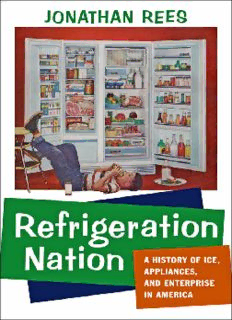
Refrigeration Nation: A History of Ice, Appliances, and Enterprise in America PDF
Preview Refrigeration Nation: A History of Ice, Appliances, and Enterprise in America
Refrigeration Nation Studies in Industry and Society Philip B. Scranton, Series Editor Published with the assistance of the Hagley Museum and Library Refrigeration Nation A History of Ice, Appliances, and Enterprise in America Jonathan Rees The Johns Hopkins University Press Baltimore ©2013 The Johns Hopkins University Press All rights reserved. Published 2013 Printed in the United States of America on acid-free paper 9 8 7 6 5 4 3 2 1 The Johns Hopkins University Press 2715 North Charles Street Baltimore, Maryland 21218-4363 www.press.jhu.edu Library of Congress Cataloging-in-Publication Data Rees, Jonathan, 1966– Refrigeration nation : a history of ice, appliances, and enterprise in America / Jonathan Rees. pages cm. — (Studies in industry and society) Includes bibliographical references and index. ISBN-13:978-1-4214-1106-4 (hardcover : acid-free paper) ISBN-10:1-4214-1106-7 (hardcover : acid-free paper) ISBN-13:978-1-4214-1107-1 (electronic) ISBN-10:1-4214-1107-5 (electronic) 1. Refrigeration and refrigerating machinery—United States— History. 2. Refrigeration and refrigerating machinery—Social aspects—United States—History. 3. Refrigeration and refrigerating machinery—Economic aspects—United States—History. 4. Cold storage industry—United States—History. 5. Cold storage industry— Social aspects—United States—History. 6. Cold storage industry— Economic aspects—United States—History. I. Title. TP492.7.R4352014 621.5(cid:2)640973—dc23 2013006073 A catalog record for this book is available from the British Library. Special discounts are available for bulk purchases of this book. For more information, please contact Special Sales at 410-516-6936 or [email protected]. The Johns Hopkins University Press uses environmentally friendly book materials, including recycled text paper that is composed of at least30 percent post-consumer waste, whenever possible. For Everett This page intentionally left blank Contents Acknowledgments ix introduction The Cold Chain 1 chapter 1 Inventing the Cold Chain 11 chapter 2 The Long Wait for Mechanical Refrigeration 31 chapter 3 The Decline of the Natural Ice Industry 55 chapter 4 Refrigerated Transport Near and Far 76 chapter 5 The Pleasures and Perils of Cold Storage 99 chapter 6 “ Who Ever Heard of an American without an Icebox?” 119 chapter 7 The Early Days of Electric Household Refrigeration 140 chapter 8 The Completion of the Modern Cold Chain 162 conclusion Refrigeration, Capitalism, and the Environment 182 Notes 195 Essay on Sources 227 Index 229 This page intentionally left blank Acknowledgments I have racked up so many professional and personal debts over the course of working on this project that I’m terrified that I’m going to forget someone im- portant, but here at least are the ones I still remember: All historians doing original research should always start their acknowledg- ments by thanking the archivists and librarians they have met because where would they be without them? William Worthington from the Smithsonian’s National Museum of American History was the person who first told me about the fire at the World’s Columbian Exposition while I was visiting there on a travel grant. I am enormously grateful for the assistance of Jan Longone, the Curator of American Culinary History at the Clements Library at the University of Michi- gan in Ann Arbor, especially in helping me find the materials I needed to finish chapters7 and 8. I remain amazed that anybody thought to save the instruction booklets that came with old refrigerators and am very grateful that Jan did. Emily Sigman of the American Society of Heating, Refrigerating and Air-Conditioning Engineers helped me long after my only trip to that group’s tremendous library in Atlanta. Here at home, Sandy Hudock and Kenny McKenzie at Colorado State University–Pueblo are both interlibrary loan superstars. Of all the places I worked on this book, I owe the greatest thanks to the Hagley Museum and Library for two separate travel grants and for letting me present sections of the book in workshops there twice. Thanks to Roger Horo- witz, Phil Scranton and everyone else at Hagley upon whom I came to depend over the years for help of all kinds. Hagley also included me in its 2006 Food Chains conference, an experi- ence that proved to be absolutely vital in determining the way I organized the considerable amount of material that I had accumulated by that time. Because of my participation in that conference, the University of Pennsylvania Press published an early version of chapter 3. Similarly, a very early section of chapter 2 appeared in Technology and Culture. Other material from chapter 3 originally appeared in Business and Economic History On-Line.
Description: